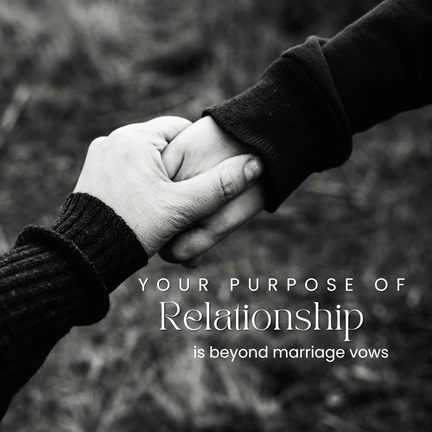Often, when people enter into a relationship, their thoughts are limited to the idea of taking it to the point of marriage. For some, the sole purpose of a relationship is to culminate in marriage, and those who don’t subscribe to this belief may face significant insecurities in their relationships.
However, we must understand whether your purpose in a relationship is marriage or anything else. Does a successful relationship necessarily have marriage as its ultimate goal? Does it fulfill your purpose of a relationship, where the aim is to achieve a ‘happily ever after’ in the end?
Today, in this article, we will discuss your purpose of a relationship and explore how it is related to marriage. We aim to understand whether getting married is truly your purpose of a relationship or if there is something beyond it. Before moving forward, let’s make an effort to understand the actual meaning of purpose in the context of a relationship.

The term purpose means the aim or the intention to do something. It serves as a motivating factor that keeps you driven until you achieve your goal. So here, it’s important to understand that the connection of purpose is with a goal that requires hard work to achieve. You view this purpose as a vision and work hard until that purpose is met. Staying on the surface of this topic without delving too deeply, let’s now try to understand the significance of your purpose of a relationship.
Do we need to have a purpose of a relationship?
Firstly, it’s essential to understand whether having a specific purpose in a relationship is necessary or if it’s not. I feel that a relationship’s beginning or start should not be driven by a specific purpose. Some connections naturally form based on your liking and involvement with someone. Sometimes, meeting someone is determined by fate; it’s just two individuals whose paths cross, and then their lives take a new turn, of which they are often unaware. Therefore, such relationships shouldn’t start with a specific purpose because then your genuine involvement in that relationship may be compromised. Let things happen organically with the flow.
However, gradually, as time passes and you start becoming serious about that relationship, having a purpose in your relationship becomes necessary. This is essential because now you have reached a phase where you can no longer take the relationship casually. Before moving forward, you need to identify the ultimate goal and your purpose of a relationship. Are you looking at it from the perspective of a lifelong journey, or is it just a short-term casual fling?
Here, my understanding of the purpose of a relationship is not necessarily about eventually turning the relationship into marriage and envisioning a happily ever after life in the long term. Of course, that can be a part of your overall purpose, but it shouldn’t be the primary focus. I mention this because what sounds easy to hear and think about doesn’t necessarily play out that way in reality.
A relationship is a journey of many ups and downs, and you need to keep in mind that you are not alone in this journey; there is someone else walking beside you. As you move forward on the upcoming path, you’ll have to match your pace with theirs, and both of you will have to face any challenges that come your way together. It’s a team effort, not just an individual contribution towards your life ahead. Therefore, your purpose of a relationship should be to strengthen the mutual bond and enhance it from the perspective of building a robust connection.
What should be your purpose of a relationship?
There is no specific guide or book that you can refer to define your purpose of a relationship. It can vary significantly from individual to individual and depends a lot on your compatibility with your partner. In today’s blog article, I can only share my perspective, but I request you to also share your thoughts in the comments section. According to you, what should be your purpose of a relationship?

Expanding on the Purpose of a Relationship: A Fresh Perspective
Relationships serve as one of the most transformative experiences in life, offering a space to grow emotionally, mentally, and spiritually. Beyond societal norms and expectations like marriage or companionship, relationships hold a deeper purpose that transcends conventional definitions.
1. Personal Growth and Self-Discovery
A meaningful relationship acts as a mirror, reflecting our strengths and areas of improvement. It challenges us to confront insecurities, break limiting patterns, and evolve into better versions of ourselves. Partners often help us explore untapped potential, encouraging us to dream bigger and achieve personal goals.
2. Building Emotional Resilience
In a world where life is often unpredictable, a nurturing relationship provides a stable emotional anchor. Together, partners navigate life’s highs and lows, creating a shared sense of resilience. Whether it’s supporting each other during career struggles or celebrating small victories, the emotional safety net of a relationship fosters courage and adaptability.
Strong relationships thrive on shared goals and values, forming the foundation for lasting connection. These shared ideals can range from raising a family to contributing to society through joint projects or philanthropy. Building a unified vision not only strengthens the bond but also ensures alignment in decision-making and future planning.
4. Encouraging Individual Independence
A healthy partnership respects and celebrates individuality. True connection doesn’t mean losing oneself in the other person; rather, it involves maintaining independence while enriching each other’s lives. This balance of “togetherness and autonomy” ensures personal fulfillment within the relationship.
5. Enhancing Mental Well-Being
Healthy relationships are known to positively impact mental health by reducing stress, fostering optimism, and offering a sense of belonging. This emotional support improves self-esteem, promotes mindfulness, and encourages healthy habits that benefit both partners.
6. Contributing to a Larger Purpose
The purpose of a relationship can extend beyond the couple, influencing communities or even society at large. Partners often inspire each other to give back through volunteer work, mentoring, or creative collaborations that leave a positive impact on the world.
7. Rediscovering Love Through Life’s Stages
As time passes, the meaning of a relationship evolves. Early on, it might focus on passion and exploration, but with maturity, it often becomes a source of companionship and shared wisdom. Rediscovering each other through different life stages keeps the relationship dynamic and fulfilling.
8. Exploring Spiritual Dimensions
Many find that relationships offer a spiritual journey, deepening their understanding of empathy, forgiveness, and unconditional love. Whether it involves practicing meditation together or pursuing spiritual goals, these shared experiences elevate the bond to a transcendent level.

Should Getting Married be the Ultimate Goal of a Relationship?
As I mentioned earlier, the culmination of a relationship in marriage should not be your purpose of a relationship. While it can serve as a shared goal, it should not be the primary objective. Getting married doesn’t mark the happy ending of a relationship; instead, I would argue that it signifies a new beginning. Regardless of how many years you may have been in a relationship before marriage, significant changes often occur in your relationship after you tie the knot.
Whether it’s a love marriage or an arranged one, true understanding between partners only develops when both individuals start living under the same roof. Until then, you cannot be certain whether the decision to marry was the right one or a hasty mistake. After marriage, significant changes occur in your lifestyle conditions and the environment surrounding you that can be very challenging to digest in a short period. These changes often bring hurdles to your relationship.
During challenging times, it’s not feasible to just break off a relationship or abandon your partner, as doing so may fulfill the marrying objective. Still, it would result in the overall failure of the relationship. This suggests that marriage can be an initial stage in defining your purpose of a relationship, indicating a serious commitment from your side. However, in reality, your purpose of a relationship should transcend marriage, allowing you to plan and build a better life together in the future.
Your ultimate relationship goal should not only focus on marriage but also include planning for life after marriage. Your goal should be centered around how you can provide your partner with a better life even after marriage, ensuring that the difference between before and after marriage is seamless. Your objective should revolve around nurturing a love life that lasts a lifetime in your relationship.
What Should be the Ultimate Goal in a Relationship/Marriage?
According to me, the most crucial aspect of a relationship is complementing each other. Complement, in this context, means fulfilling each other’s shortcomings. It might sound quite profound, doesn’t it? However, understanding this is important. Your purpose of a relationship should be to complement each other, fulfilling each other’s voids. Complementing each other in life is crucial for maintaining balance. Why is it necessary? Let’s understand this through an example.
The strength of any wall depends on the type of bricks and cement used to create it. Without bricks and cement, a wall is not a wall; it’s just a framework that cannot provide shelter in sunlight, strong winds, and rain. This framework requires sturdy bricks and good-quality cement to give it the form of a strong wall.
If the strength of the cement and bricks is robust, the wall can be raised as a dam and can even withstand the force of the river to prevent water from seeping through. On the other hand, walls made with weaker bricks and cement might crumble down when faced with light floodwaters.
Just as good cement provides strength to bricks, enabling them to withstand sunlight, strong winds, and rain, similarly, bricks, when combined with that cement, create a wall so sturdy that standing inside it, one might be oblivious to what’s happening outside. Without bricks, a wall cannot stand with just cement, and even if somehow constructed, it would merely be a shapeless mud framework.
It’s essential to understand here that merely combining cement and bricks to create a wall is not the primary purpose. The primary aim is to build a wall so robust that it can endure various adverse climatic conditions for an extended period without breaking. After enduring such conditions, the wall may develop some cracks or minor damage. To withstand this, the solution lies in using cement to fill those cracks or adding more bricks to extend and fortify the wall.
In this context, the strength of a relationship depends on how well you can complement each other to withstand all the challenges and harsh realities of life. If you cannot complement each other in the areas where your partner feels lacking, and if you cannot boost their morale when they are feeling low, the bond in the relationship may not remain strong for long.
It is essential to complement each other for a strong relationship, becoming their strength to overcome their shortcomings and turning their strength into your own when you feel weak should indeed be your purpose of a relationship. If you can accomplish this, you will naturally find joy in your upcoming life. That’s my promise.
While there can be several individuals or shared goals for your purpose of a relationship, it all depends on the nature of the relationship you wanna have with your partner, but I believe the below goals should be given the most priority in a relationship:
Building Trust: Trust is a cornerstone in any relationship. It is an element that may take years to construct, yet its foundation can be fragile and susceptible to breaking within moments. Therefore, a shared goal in your purpose of a relationship should be to cultivate and preserve mutual trust. Your partner should have such confidence in you that no doubts or questions arise in their mind, and this level of trust can only be achieved by maintaining transparency.
If you understand and address your partner’s concerns, whether or not they lead to remediation, you are inherently building trust. The outcome of the remediation may be of lesser significance; what truly matters is the effort you invest in alleviating your partner’s areas of concern.
Openness in Communication: Open communication doesn’t merely imply providing your partner with an opportunity to express themselves; it also involves creating an environment where they feel at ease discussing matters openly.
Expressing one’s emotions can be a challenging task, and it becomes achievable when there is a sense of comfort in conversing with you. Furthermore, it’s not only about encouraging them to articulate their feelings but also about actively listening. Patience is the key to fostering open communication.
As partners, both of you should be willing to engage in open conversations, attentively listening to each other’s concerns and suggestions. It is crucial to establish a culture of transparency where both parties feel comfortable sharing their thoughts and feelings.
Understanding your partner: It should be your paramount goal in a relationship. It involves delving into their thoughts, comprehending their mindset, understanding the environment in which they were raised, and acknowledging the circumstances that have shaped their perspective on life today. Many partners make the mistake of prioritizing themselves over understanding their significant others, leading to complexities in the relationship.
It’s crucial to recognize that everyone is unique, shaped by diverse upbringing and personal experiences. If your partner disagrees on a matter, even if it seems morally correct, it is essential to grasp the underlying thoughts that have influenced their decision.
Creating a safe environment for your partner: Creating an environment where your partner feels physically, emotionally, and mentally safe is paramount. You should strive to make them so comfortable that they don’t feel the need for you to pry into their matters, and they willingly share everything when the time is right. The goal is to establish a space where both of you are content, experiencing a sense of belonging and a homely atmosphere.
It’s crucial to remember that a toxic environment can have a detrimental impact on your mental and emotional well-being. Such an atmosphere not only jeopardizes your relationship but also poses a risk of emotional breakdown. Therefore, nurturing a space that promotes safety and comfort is vital for the health and longevity of the relationship.
Mutual Respect: One of the most crucial goals that should be a part of your purpose of a relationship is mutual respect. If you don’t respect each other, there are minimal chances that your relationship will remain peaceful and harmonious in the long run. Respect in a relationship entails being heard and at the same time actively listening to your partner.
It involves understanding your partner’s emotions, feelings, and concerns, and allowing them to express themselves openly without hesitation. Creating an environment where your significant other feels equal in all aspects. It’s about making them feel valued and appreciated, and giving them due importance when making significant life decisions.
It also involves controlling your anger and treating them fairly and appropriately during heated moments. Overall, it’s about feeling and making them feel valued and appreciated.
Resolve Problems: A relationship involves navigating life’s challenges and striving for a peaceful and harmonious coexistence. Disagreements are common in any relationship, but how you handle and resolve conflicts is crucial to restoring normalcy.
It’s essential to give due importance to finding a mutually agreeable solution. Collaborating with your partner is key, as understanding their key concerns and pain points, and empathizing with their perspective.
It requires thinking multidimensionally and finding a resolution that addresses the conflict peacefully, without favoring one side exclusively. Instead of focusing on assigning blame, your focus should be on identifying actions that can be taken to resolve the problem.
Resolving conflicts often requires a bit of adjustment and a willingness to make small sacrifices. It’s about finding common ground and working together to overcome challenges, fostering a sense of understanding and unity in the relationship.
Devote Time: Time is the most precious element in a relationship. Merely existing in a relationship is not enough; you must also invest in it, and this investment primarily takes the form of dedicated time. Therefore, the devotion of time should be a significant goal in your purpose of a relationship to make your partner feel included. A relationship is not a fleeting matter where you invest heavily in the beginning and gradually lose interest.
It is a lifelong journey where you need to consistently invest your time to reap sweet returns in the long run. Your time is not only valuable for yourself but is equally precious for your partner. Therefore, avoid wasting it on frivolous and unimportant matters.
The lack of sufficient time is often a common reason for the weakening of bonds in a relationship. It’s essential to recognize this and make a conscious effort to allocate enough time regularly, ensuring the strength and vitality of the relationship in the long term.
Uplift their Morale: Another important goal should be to uplift the morale of your partner whenever they are feeling low in life. Life is bound to throw various challenges that can significantly impact the morale of either you or your partner. In such circumstances, it becomes your responsibility to provide support, boost their spirits, and uplift their fallen morale.
This is a vital element in strengthening the bonds of a relationship because, during challenging times, everyone needs someone they can trust, someone who assures them that they are not alone. Your role is to be that support system, to make them feel that they are not wrong and that whatever they are going through, you are there with them.
Providing proper guidance and helping them realize that the current challenge is just a small part of life’s journey that can be overcome together is essential. By being a source of encouragement and understanding during tough times, you not only strengthen your relationship but also contribute to building a sense of security and trust between you and your partner. It’s a powerful way to demonstrate that you are committed to facing life’s challenges together as a team.
Never Giving Up: The last and final goal in your purpose of a relationship should be about never giving up. Once you’ve taken a relationship seriously, you must commit to it. The thought of stepping out of it should never cross your mind. Consider it as a contract with no exit clauses. Regardless of how challenging the circumstances become, you need to persevere until everything is sorted out.
However, this doesn’t mean blindly accepting everything; it’s crucial to respect each other’s boundaries and collaboratively find ways to make things work for a harmonious life. Maintaining relationships is not for quitters, and it reflects the level of commitment in a relationship. True commitment involves not giving up, even when faced with difficulties.
Both partners need to stay strong and not succumb to defeat. No matter how many problems arise, the focus should always be on finding mutually agreed solutions. This commitment and resilience are key factors in building a lasting and fulfilling relationship.
While there could be numerous other goals in your purpose of a relationship, I firmly believe that if you can successfully implement these objectives in your relationship, your remaining shared goals will naturally fall into alignment. Nevertheless, please feel free to share your thoughts in the comments if you believe that there should be any additional goals added to the above list. I am eager to hear your insights on this matter.
Conclusion
To Conclude, your purpose of a relationship should be beyond marriage vows because a relationship is not confined to marriage; true life begins after that. Your purpose of a relationship shouldn’t be limited to just formalizing your love in marriage; it should extend to providing your partner with a life where the distinction between pre and post-marriage phases is minimal.
The primary objective of a relationship should be to complement your partner, turning their weaknesses into strengths, and, in return, allowing them to uplift you in your vulnerable moments. Additionally, based on the nature of your relationship, you can set various goals that enhance and enrich your connection. I hope you enjoyed this article; please feel free to share it with your friends.

